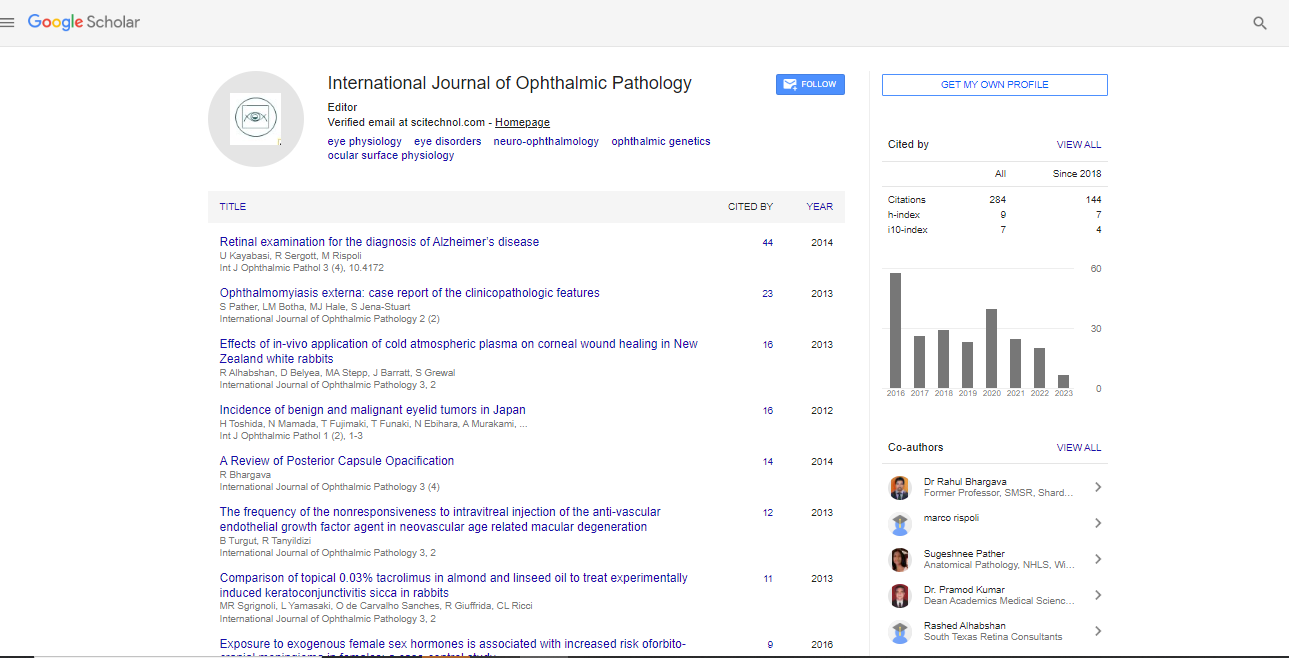Perspective, Int J Ophthalmic Pathol Vol: 12 Issue: 1
Overcoming Visual Impairment with Vision Rehabilitation
Schiefer Zander*
1Department of Ophthalmology and Visual Sciences, University of Iowa Carver College of Medicine, Iowa City, United States of America
*Corresponding Author: Schiefer Zander
Department of Ophthalmology and Visual Sciences, University of Iowa Carver College of Medicine, Iowa City, United States of America
E-mail: zandschi@uiowa.edu
Received date: 03 February, 2023, Manuscript No. IOPJ-23-92430;
Editor assigned date: 07 February, 2023, PreQC No. IOPJ-23-92430 (PQ);
Reviewed date: 21 February, 2023, QC No. IOPJ-23-92430;
Revised date: 28 February, 2023, Manuscript No. IOPJ-23-92430 (R);
Published date: 07 March, 2023, DOI: 10.4172/2324-8599.12.1.4
Citation: Zander S (2023) Overcoming Visual Impairment with Vision Rehabilitation. Int J Ophthalmic Pathol 12:1.
Description
Vision rehabilitation is a process that involves various therapies, strategies, and technologies to help individuals overcome the challenges of visual impairment. It aims to improve the functional abilities of people with visual impairments and enable them to perform daily activities independently.
Visual impairment
Visual impairment refers to a condition in which a person's ability to see is compromised to some degree. It can range from mild to severe, and can be caused by various factors, including eye diseases, injuries, genetic conditions, or neurological disorders. People with visual impairment may experience a range of symptoms, including blurred vision, partial or total loss of vision, difficulty seeing in low light conditions, or problems with depth perception.
Vision rehabilitation
Vision rehabilitation is a type of therapy that aims to help individuals with visual impairment to maximize their remaining vision, maintain their independence, and improve their quality of life. It involves a range of interventions and techniques, including vision therapy, low vision aids, and adaptive strategies for daily living.
Strategies for Overcoming Visual Impairment
Overcoming visual impairment can be a challenging process, but there are many ways to adapt and thrive despite this condition. Here are some strategies that can be helpful:
Seek medical treatment
If anyone has any type of visual impairment, it's important to consult a medical professional to determine the cause and to get treatment, if possible. Some conditions can be treated with medication or surgery.
Use assistive technology
There are many assistive technologies available to help people with visual impairments. Examples include screen readers, magnifying software, and braille displays. These tools can make it easier to access information and communicate with others.
Develop new skills
If anyone has visual impairment, they may need to learn new skills to navigate the world. For example, a person is willing to learn how to use a cane or guide dog to get around safely, he may also need to learn how to read braille or use other tools for communication.
Build a support network
It's important to have a support network of friends, family, and professionals who can help people who will navigate the challenges of visual impairment. This can include support groups, rehabilitation services, and counseling.
Focus on the strengths
It is important to acknowledge the challenges of visual impairment, it is also important to focus on the strengths and what they can do. Many people with visual impairments excel in areas such as music, writing, and public speaking.
Stay active
Physical activity can help maintain overall health and well-being, which can be especially important for people with visual impairments. Activities such as yoga, swimming, and walking can be adapted to accommodate visual impairments.
Be proactive
Fear to advocate for one’s self and ask for accommodations when necessary which may include requesting larger print materials or asking for assistance when navigating unfamiliar environments.
Every person's experience with visual impairment is unique, and what works for one person may not work for another. It's important to find strategies that work for people and support their needs to thrive.
 Spanish
Spanish  Chinese
Chinese  Russian
Russian  German
German  French
French  Japanese
Japanese  Portuguese
Portuguese  Hindi
Hindi 